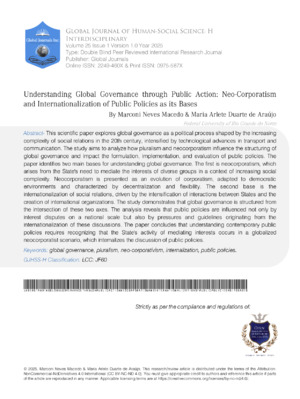Understanding Global Governance Through Public Action: Neo-Corporatism and Internationalization of Public Policies as Its Bases
Keywords:
global governance, pluralism, neocorporativism, internalization, public policies
Abstract
This scientific paper explores global governance as a political process shaped by the increasing complexity of social relations in the 20th century intensified by technological advances in transport and communication The study aims to analyze how pluralism and neocorporatism influence the structuring of global governance and impact the formulation implementation and evaluation of public policies The paper identifies two main bases for understanding global governance The first is neocorporatism which arises from the State s need to mediate the interests of diverse groups in a context of increasing social complexity Neocorporatism is presented as an evolution of corporatism adapted to democratic environments and characterized by decentralization and flexibility The second base is the internationalization of social relations driven by the intensification of interactions between States and the creation of international organizations The study demonstrates that global governance is structured from the intersection of these two axes The analysis reveals that public policies are influenced not only by interest disputes on a national scale but also by pressures and guidelines originating from the internationalization of these discussions The paper concludes that understanding contemporary public policies requires recognizing that the State s activity of mediating interests occurs in a globalized neocorporatist scenario which internalizes the discussion of public policies Future research on public policy subsystems should consider both neocorporatist elements and the influences of international organizations whether of a technical content or political pressure in a given direction
Downloads
How to Cite
References

Published
2025-04-14
Issue
Section
License
Copyright (c) 2025 Authors and Global Journals Private Limited

This work is licensed under a Creative Commons Attribution 4.0 International License.